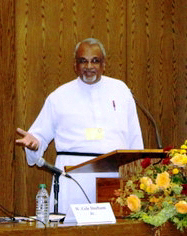





Symposium 2011 came to a close in a plenary session on Tuesday afternoon, October 4, 2011. Center Director Professor W. Cole Durham, Jr. invited seven Symposium delegates and one audience member to join him in summarizing the event for all assembled in the Law School's Moot Court Room and listening in via live Internet stream. Joining Professor Durham during this hour were
- David Rodearmel – U.S. Foreign Services Officer, currently assigned to Stuttgart, Germany, former Symposium delegate, this year an audience member;
- Mariatu Bangura – Senior Executive, Gender and Children's Affairs, Ministry of Social Welfare, Sierra Leone;
- Justice Anthony Penrose Randerson – Justice, Court of Appeals, New Zealand;
- Eugenio Cedeño Areché – Deputy, National Congress, Chamber of Deputies, and President, Human Rights Commission, Dominican Republic;
- Brian Grim – Director of Cross-National Data and Senior Researcher in Religion and World Affairs, Pew Research Center's Forum on Religion and Public Life;
- Vicente Lines – Attorney at Law, Costa Rica;
- The Reverend Thomas Philips – Member of the Malaysian Consultative Council of Buddhism, Christianity, Hinduism, Sikhism, and Taoism;
- Jorge Horacio Gentile – Professor of Constitutional Law and Director, Universidad Católica Argentina; Argentine Council for Religious Liberty (CALIR).
Echoing the sentiments of many, Mr. Rodearmel said he was struck in attending Symposium events this year by how we have some distance to go yet in formulating mutually agreed upon international standards on religious freedom. "But encounters such as this one help greatly along that road, in making that journey."
The problems, observed Minister Bangura, are not with belief, not with religion. The problems are cultural and political. What is needed in each nation, she said, is what they have in Sierra Leone: A "melting pot" to mediate differences, a national religious council for engaging in interreligious dialogue. A Christian with a Muslim husband and Christian children, and parents who are one Christian and one Muslim, Ms. Bangura sees a hopeful future if people of all faiths can engage in meaningful, productive, and tolerant dialogue. She was touched, she said, at the way the students and hosts at the Symposium served the delegates. "As delegates, we should take that home with us, it should be part of us. I'm going to take all of what I have learned here to my country. From what I have learned here, I believe I will be in a position to influence, to give advice as to how we can improve."
Further summary of the concluding session, including remarks by other speakers, will be available here soon, along with a video recording of the session.
